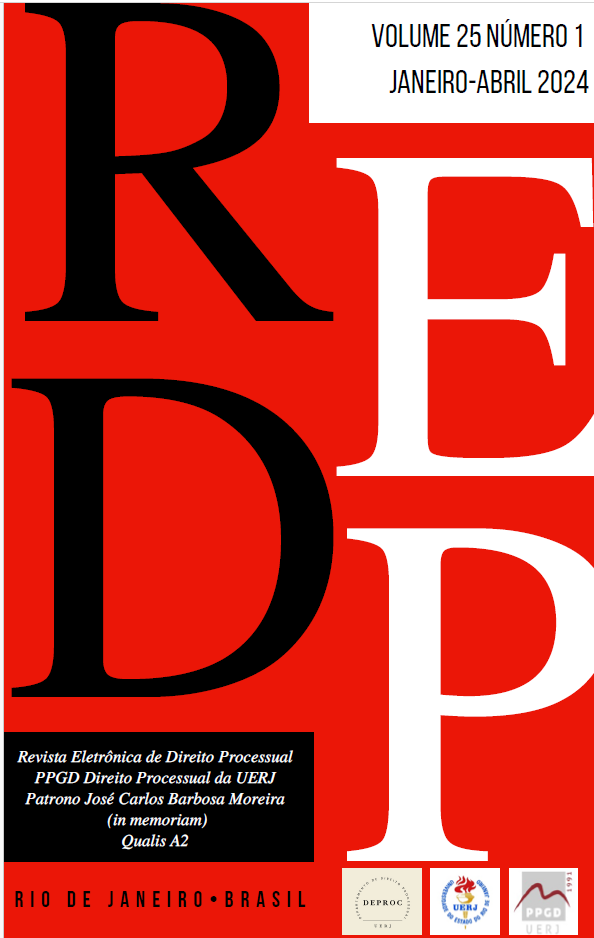CLAIMS RESOLUTION FACILITIES: UMA ANÁLISE DA DESJUDICIALIZAÇÃO DA EXECUÇÃO EM PROCESSOS ESTRUTURAIS
DOI:
https://doi.org/10.12957/redp.2024.81919Abstract
The accomplishment of rights provided in judicial and extrajudicial executive titles represents a disturbing difficulty in the Brazilian legal system, as revealed by the report "Justice in Numbers" from the National Council of Justice. It is in the enforcement phase that the legal system is put to the test in any and every process, especially in the context of structural processes that cope with demands of a complex nature. In this regard, the structural process requires distinct treatment both in the cognitive phase and in the enforcement stage. This research aims to understand how it is possible to conceive the enforcement in structural processes outside the Judiciary, even under its supervision, through claims resolution facilities, also known as "specific infrastructure entities," with the perspective of providing the best treatment for complex demands and inspired by the proposals of Bill No. 6204/2019, which aims to de-judicialize the civil execution of certain amount. In order to achieve this goal, this study analyzes structural processes, their uniqueness, the need for conflict characterization, and the selection of appropriate treatment, as well as techniques for managing multifaceted demands through case management and Court management. Furthermore, the study examines how the current Code of Civil Procedure has provided tools for structural processes by emphasizing the principles of cooperation, the possibility of establishing legal transactions, and the appropriate treatment of demands in both the cognitive and enforcement phases. The research also explores the nature of specific infrastructure entities, their control mechanisms, as well as their advantages and disadvantages. The chosen methodological approach was the hypothetical-deductive method. As for the technique, the bibliographic review and documentary analysis were chosen, resorting to legislation and procedural doctrines as additional sources of information. Finally, it was concluded that specific infrastructure entities are able to conduct the enforcement phase in structural processes, ensuring management, transparency, participation of involved parties, effectiveness, efficiency, and appropriate treatment for structural cases.
Downloads
Published
How to Cite
Issue
Section
License
Copyright (c) 2024 Rosalina Moitta Pinto da Costa, Gisele Santos Fernandes Góes, Iracecilia Melsens Silva da Rocha

This work is licensed under a Creative Commons Attribution 4.0 International License.
Todos os artigos publicados na Revista Eletrônica de Direito Processual (REDP) (Departamento de Direito Processual, Universidade do Estado do Rio de Janeiro, Brasil) são licenciados por meio de uma Licença Creative Commons - Atribuição 4.0 Internacional (CC BY 4.0).
Os autores retêm os direitos autorais de seu artigo e concordam em licenciar seu trabalho com a licença CC BY 4.0, aceitando assim os termos e condições específicos desta licença disponíveis no seguinte website: https://creativecommons.org/licenses/by/4.0/legalcode.
- Os autores concedem à REDP o direito de primeira publicação, de se identificar como publicadora original do trabalho e concedem à revista uma licença de direitos não exclusivos para utilizar o trabalho das seguintes formas: Reproduzir, vender e distribuir cópias eletrônicas ou impressas do manuscrito como um todo, de partes específicas do manuscrito e de suas traduções para qualquer idioma;
- O uso do artigo por terceiros é livre, contanto que a integridade da publicação seja mantida e seus autores originais, periódico de primeira publicação e detalhes de citação sejam identificados.
Dentro dos termos da licença, os autores podem entrar em acordos contratuais adicionais separados para a distribuição não exclusiva da versão publicada do trabalho na revista.
Copyright and Licensing
All articles published in the Procedural Law Electronic Review (REDP) (Department of Procedural Law, State University of Rio de Janeiro, Brazil) are licensed under a Creative Commons License - Attribution 4.0 International (CC BY 4.0).
- Authors retain copyright to their article and agree to license their work under the CC BY 4.0 license, thereby accepting the specific terms and conditions of this license available at the following website: https://creativecommons.org/licenses/by/4.0/ legal code.
- Authors grant REDP the right of first publication, to identify itself as the original publisher of the work, and grant the journal a non-exclusive license to use the work in the following ways: Reproduce, sell and distribute electronic or printed copies of the manuscript as a whole, of specific parts of the manuscript and its translations into any language;
- Use of the article by third parties is free, as long as the integrity of the publication is maintained and its original authors, first publication journal, and citation details are identified.
Within the terms of the license, authors may enter into separate additional contractual agreements for the non-exclusive distribution of the published version of the work in the journal.






